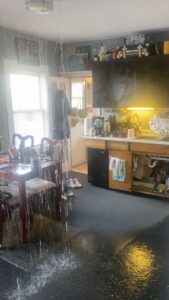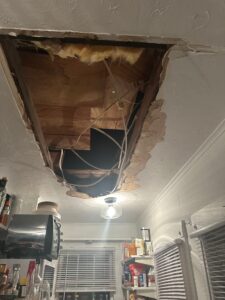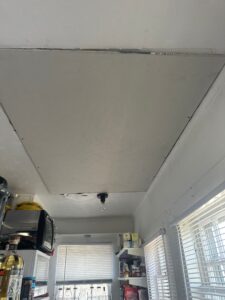PROVINCETOWN — Two years after the new owners of Napi’s Restaurant evicted at least seven former employees from restaurant-owned housing, current tenants of those units continue to face the threat of eviction.
According to Provincetown attorney Robert Lowe and documents obtained by the Independent from Lowe and through public records requests, one tenant has endured substandard living conditions since moving into an apartment in 2021. When he complained, he was subjected to harassment and intimidation by the landlord.
That tenant and at least one other living in restaurant-owned housing have said they are currently facing eviction. The Independent is not publishing the tenants’ names to reduce the chances of discrimination against them by potential future landlords — a common occurrence, say advocates for tenants’ rights.
Anton “Napi” Van Dereck Haunstrup, the longtime owner of the restaurant, died on Christmas Day 2019. Since then, Napi’s has been run by Berni McEneaney and Dan Sabuda. Neither McEneaney nor Sabuda responded to repeated requests for comment.
Attorney Lowe’s client moved into a second-floor unit at 7 Standish St. in September 2021 after working as a bartender at Napi’s for a summer, Lowe said. The previous occupant of the unit, Delroy Brennan, worked at Napi’s for 19 years before being evicted along with six other tenants, all of them from Jamaica, who were Napi’s employees. According to several knowledgeable sources, a few of them, including Ellis Wilson, Tony Cleary, Kevin Linsey, and Dwight Sangster, eventually found housing elsewhere on the Outer Cape.
In the last four months, Lowe’s client experienced two flooded apartments, lived without heat and water for at least two weeks in February, and received threats of physical harm from Lisa Meads, the office assistant at the restaurant. On April 27, he received a notice demanding he vacate his unit by June 1. He is waiting to fight the eviction in court, according to Lowe.
McEneaney, who lives in Marstons Mills, was Napi’s longtime financial adviser. McEneaney took control of Napi’s estate after winning a lengthy court battle against Judy Saffron, Napi’s half-sister. Napi’s wife, Helen Haunstrup, was the original executor of the will, but in 2018 Helen was diagnosed with dementia, and in 2020 she was declared unfit to manage the estate.
In December 2021, McEneaney and Sabuda informed employees that they were closing the restaurant for the winter — the first time that had been done since it opened in 1978.
According to Lowe, Sabuda told Lowe’s client to go on unemployment until the restaurant reopened. The tenant instead found work at another restaurant. In March 2022, the tenant received a text message from McEneaney: “I expect you will be vacated by the end of today, new tenant will be here Monday,” it read. “I will not accept anything otherwise.”
McEneaney’s message continued: “You will be considered trespassing tomorrow and therefore I will empty the place for you. I will leave your stuff in the space below the front of the building and cover it with a tarp.” McEneaney argued that because the tenant was not an employee of Napi’s he could no longer live on the property, Lowe said.
For months afterward, McEneaney and Meads repeatedly threatened to evict the tenant, Lowe said. None of those threats amounted to adequate notices to quit under state law, Lowe said.
“They would leave notes on his door telling him to get out, but they never sent him a formal notice,” Lowe said. “Then for a while, things were quiet.”
The First Storm
On Feb. 4 of this year, an Arctic blast brought subzero temperatures to Provincetown, freezing and bursting water pipes across town. The apartment at 7 Standish St. was one of those damaged in the storm. At 2:30 p.m., the tenant heard a loud pop and then the sound of rushing water. Water began to spurt from a burst pipe in the kitchen ceiling.

The tenant called his landlord’s office. According to Housing Court records, Meads told him “they were not responsible” for fixing the pipes because they were evicting him.
In a telephone interview with a reporter, Meads said the court documents are incorrect. “I didn’t tell him it wasn’t our responsibility,” she said. “I told him we couldn’t get any plumber in town to come fix it.”
According to an affidavit of support for a temporary restraining order the tenant later filed, the tenant himself found a plumber who agreed to turn off the water. The affidavit stated that it “required turnoff from the water main outside of the building,” because the shutoff valve in the basement “was rusted and frozen.” The tenant said the valve’s handle broke off when he tried to turn it.
For the next couple of days, the tenant used fans in an effort to dry out the apartment. He received a text from Meads saying, “You will have to find somewhere else to live,” he said.
The tenant then contacted the Provincetown Board of Health. According to town records, Health Agent Lezli Rowell inspected the building on Feb. 7. In her report, she documented numerous violations of the state sanitary code, including “no heat and damaged plumbing” in the building. Rowell reported a temperature of 60 degrees in the tenant’s unit at 8:30 a.m. The state sanitary code requires rental units to be heated to at least 68 degrees between 7 a.m. and 11 p.m.
Rowell also found that the ceiling above the door was open and “exposed to weather,” her report said. “Property managers report plumbing damages that were in diagnosis and repair prior to the recent frozen/burst pipes causing additional damage,” she wrote.
An enforcement letter from Rowell ordered Sabuda “to make a good faith effort to correct these violations within 24 hours by reporting to Provincetown Health.” It also ordered Sabuda to relocate the tenant to a different unit.
McEneaney offered the tenant a new rental at $1,700 a month — almost double the $950 he had been paying.
On Feb. 21, Lowe filed a temporary restraining order against McEneaney demanding that he relocate the tenant to an apartment at 27 Bradford St. for $950 a month. The town housed the tenant at the Admiral’s Landing hotel for four nights before he was given the keys to 27 Bradford St. on March 1, according to board of health chair Susan Troyan.
The tenant lived at 7 Standish St. for more than two weeks without heat or water. He used the bathroom at CVS and showered at the Provincetown Gym, Lowe said.
Meads told the Independent on June 4 that “the whole place is completely fixed now” and that Rowell “had come by to inspect it.” But Provincetown Building Commissioner Anne Howard said on June 5 that she had not received word of any repairs, and that the building still did not have a certificate of occupancy. Troyan confirmed that the property managers have not yet requested an inspection from the health dept.
The Second Storm
A month and a half after the tenant moved into the unit at 27 Bradford, a rainstorm on April 16 and a leaking roof created a hole in the ceiling above the kitchen, causing yet another cascade into the tenant’s living quarters.

Again, he contacted Meads, this time asking to have the roof repaired. Meads showed up at the tenant’s apartment on April 21. According to a police report of the incident, “Meads threatened to have her boyfriend, Robert Martin, go to the tenant’s apartment on Bradford St., throw his belongings onto the street, and damage the tenant’s car.” Lowe said that Meads told the tenant that Martin would “smash his car, and then smash him” if he went to the board of health again.
Meads said that the police report is “all lies,” and that the tenant “was never threatened. I told him, ‘You’re on your own.’ ”
After his encounter with Meads, the tenant patched the ceiling himself, Lowe said.
Six days later, on April 27, an official notice to quit arrived at the tenant’s doorstep from McEneaney’s attorney, Anthony Alva of Barnstable. It demanded that the tenant vacate the property by June 1. The reason for eviction, according to the document, was that the rental “needs repairs.” The document said that the tenant’s occupancy was “incidental to his employment, which he quit.”

The notice also stated: “The Landlord provided this current rental after he made false claims to the Housing Court after he created flooding conditions at 7 Standish Street.”
Alva did not respond to multiple requests for comment.
According to Lowe, McEneaney’s notice to quit is a clear violation of the law. In Massachusetts, a landlord cannot evict a tenant within six months of the tenant’s exercising his legal rights. This includes reporting possible violations to the board of health or other officials. Both the tenant’s report to the board of health on Feb. 6 and to the Provincetown police on April 21 fall within the six-month period.
“It’s a retaliatory eviction, and it’s clearly illegal,” Lowe said. “McEneaney is a bully and a slumlord.”
Lowe added that “whether they are going to proceed in court, I have yet to see. But if they do, they are going to be hit with a lot of counterclaims.”
The tenant told the Independent that “every day I wake up afraid that I am going hear a knock on my door. I’m fighting to be a part of this community.”
